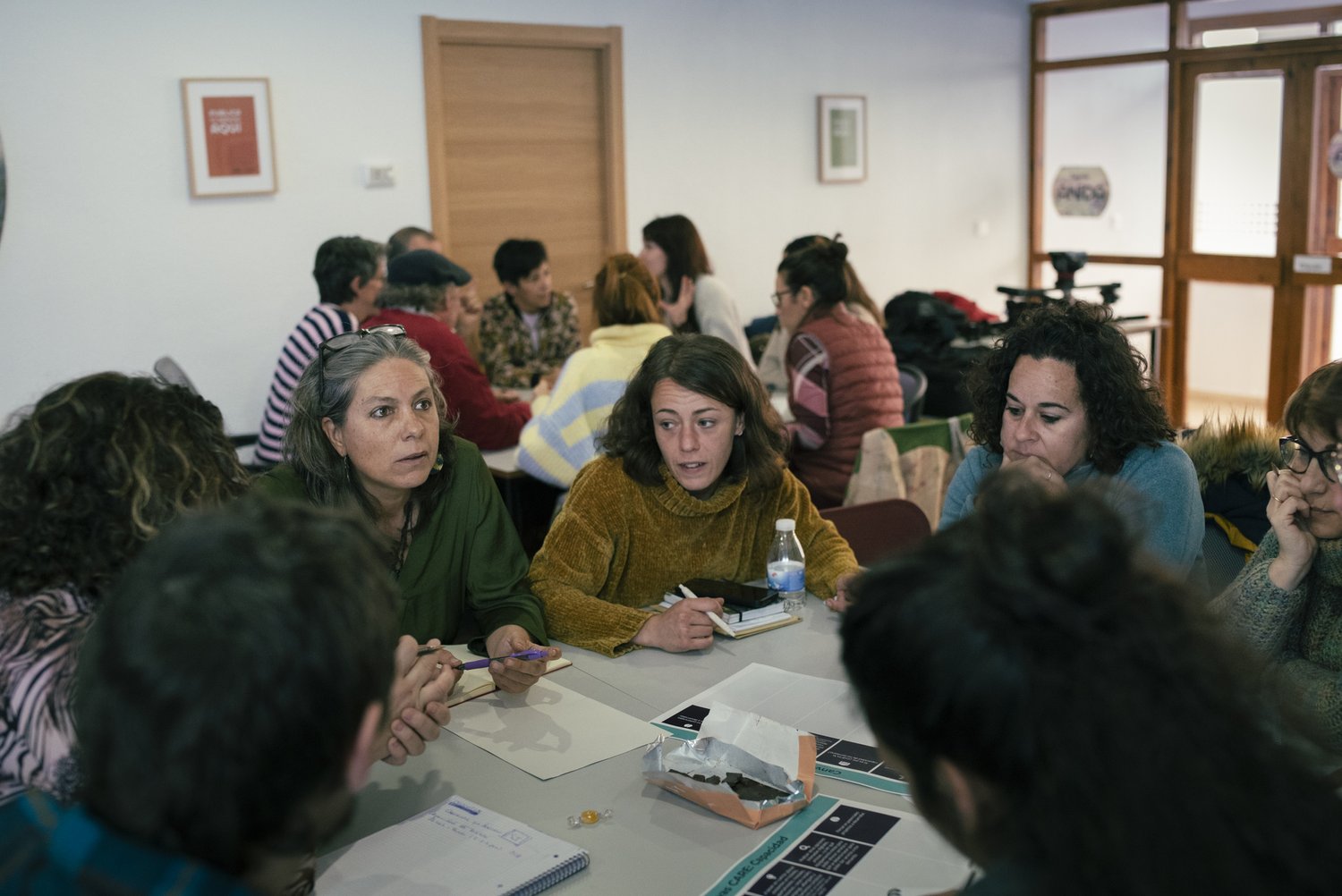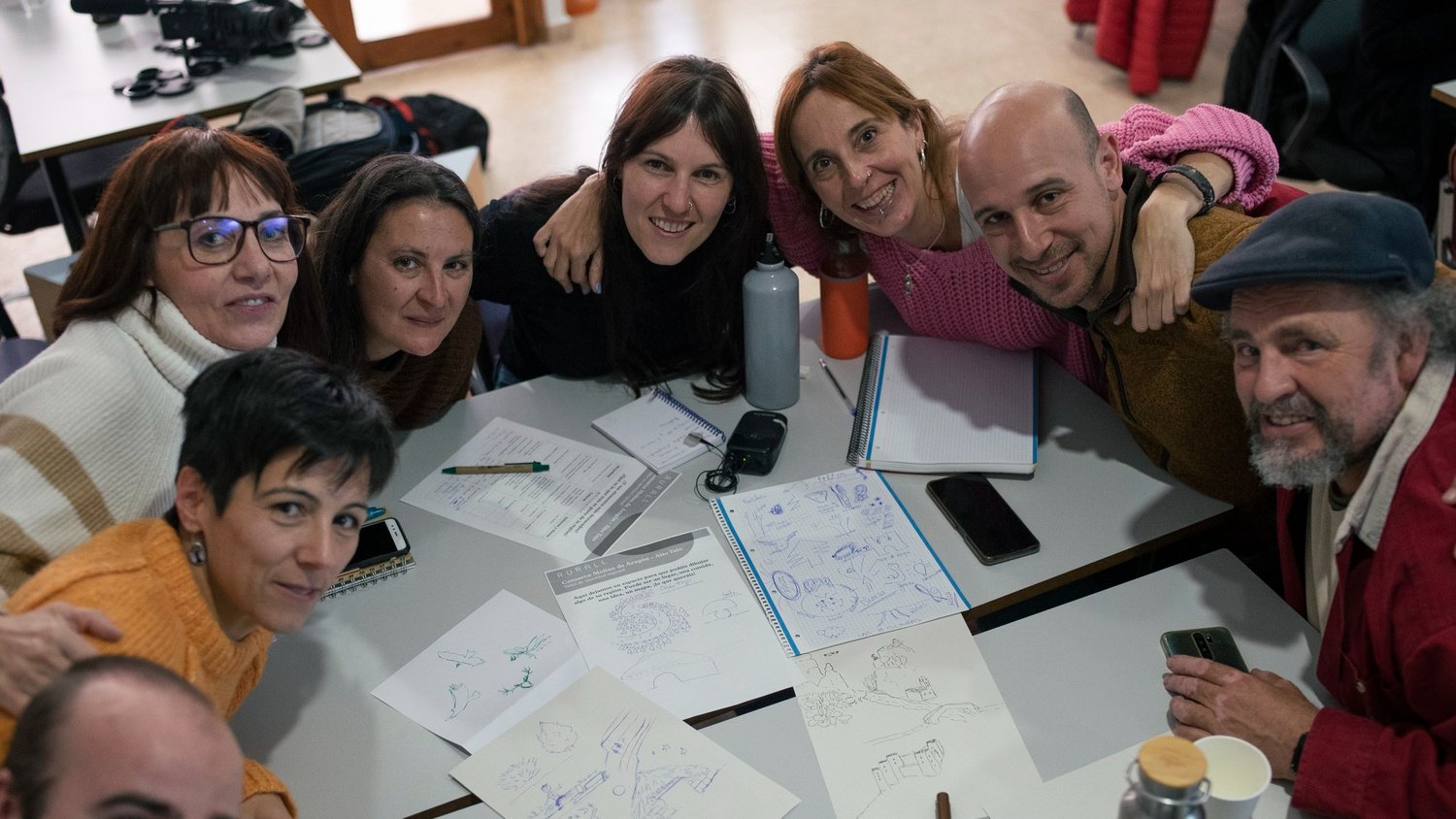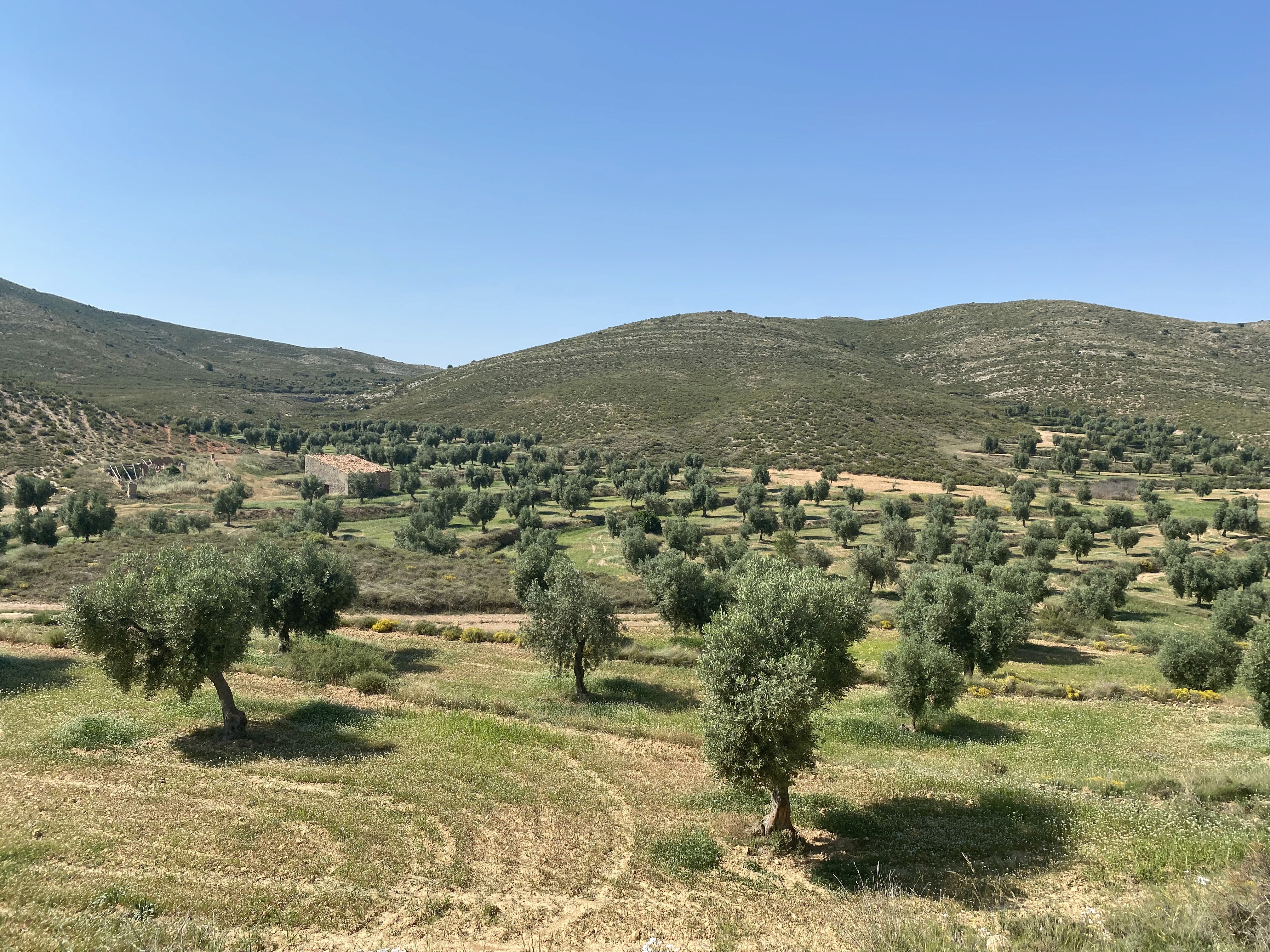Regenerative tourism
Regenerative tourism
Co-creation and inclusion to boost the España Vaciada
Co-creation and inclusion to boost the España Vaciada
28 de marzo de 2024


By Sandra Campos, consultant specialising in tourism, and Pako Rodríguez, head of tourism (Original publication in Spanish).
Is it possible to promote tourism initiatives that contribute to responsible, inclusive tourism and at the same time fight against depopulation? The project ‘Inclusive Experiences against depopulation’ RurAll, funded by the European Union - Next Generation EU and the Ministry of Industry, Trade and Tourism, aims to bring tourism to any territory in an inclusive way through replicability, while fighting against depopulation.
What is RurAll?
RurAll or Inclusive Experiences against depopulation is a project within the framework of the 1st call of Experiences Spain of the Ministry of Commerce, Industry and Tourism on the Recovery, Transformation and Resilience Plan, Funded by the European Union - NextGenerationEU.
Its objective is to help develop territories as regenerative tourist destinations through the replicability of tourism initiatives with a positive impact, using tourism as a tool to fight against the depopulation of rural areas.
The project has been developed by a consortium of five organisations that complement each other's knowledge and know-how:
Ideas for Change, an innovation consultancy firm and coordinator of the consortium. Its main function is the development of the territories through participatory workshops and its own destination analysis methodology, which we will discuss later. Working alongside her are the two organisations whose initiatives will be replicated:
Apadrina un Olivo and Sentir el Alto Tajo. Both initiatives, winner and finalist of the FiturNext Observatory for sustainable tourism at FITUR, are located in rural areas and share a demographic context of depopulation.
The fourth partner organisation is Aethnic, the Sustainable Tourism Association. Aethnic is responsible for the generation of networks, synergies and governance systems for the relationships and links generated in the project.
The fifth partner of the project is Mem branding, a design and branding agency whose objective is to develop the visual identities of the 5 territories and to accompany them in the promotion of the new experiences created.
Depopulation and tourism: some facts
According to UN data, 55% of the world's population lived in cities in 2018, a percentage that is expected to reach 70% by 2050 (1). These cities consume 75% of energy resources and emit 80% of the carbon that pollutes the environment (2).
In Spain, rural areas (with less than 30,000 inhabitants and a population density of less than 100 h/km2 ) cover 84% of the country's surface area, but are home to only 15.9% of the population (3). This 84% of the territory is what we know as Empty Spain - which is not empty because it does not, on most occasions, have a voluntarist component.
Spain is the fourth country in Europe, after Estonia, Finland and Latvia, with the most municipalities at risk of depopulation. In fact, the most inhospitable geographical areas of the world, such as Mongolia and Finnish Lapland, have territories with demographic ratios of around 1.55 h/km2 or 1.8-2h/km2 respectively, while certain enclaves in the Spanish Serranía Celtibérica have ratios of 1h/km2 (4).
This depopulation and tendency towards concentration in cities is causing what is known as ‘demotanasia’, understood as the slow and silent disappearance of the population of a territory, which emigrates and leaves the area without generational replacement (5).
But the depopulation of rural areas goes beyond the abandonment of villages. It worsens people's quality of life, contributes to the abandonment of crops that causes desertification and soil acidification, neglects the environment in the face of fires and deteriorates the environment.
Inclusion, accessibility and gender perspective
Inclusive experiences against depopulation aims to deepen the development of rural tourist destinations in terms of inclusion. This extends to the field of accessibility, allowing all people to enjoy tourist experiences, regardless of their physical, sensory or cognitive abilities. This is a fact of great relevance in the rural context, as it is the type of tourism with the least accessible and/or adapted offer.
It also extends to the field of equality and the gender perspective, especially in a context such as the rural one, where women's contribution is of inestimable importance (6). As the UN states, rural women (a quarter of the world's population) contribute to the food security of their communities, generate resilience in the face of climate change and strengthen local economies, often being the driving force behind their families. However, gender inequalities and the economic, social and technological context in which we live limit their potential, placing them behind urban women and men (7). For this reason, the project aims to vindicate and disseminate the value of the role of women in rural environments, as a fundamental component of the development of their territories.

Depopulating territories
The rural territories participating in the project have a common characteristic: they all suffer from a continuous loss of residents and therefore depopulation.
Of the five territories, two are what we call ‘origin’ territories, i.e. those where the two experiences to be replicated in the other three territories, which we call ‘destination’, are located.
Territories of origin:
Molina de Aragón - Alto Tajo region. Region in the province of Guadalajara (Castilla - La Mancha), with an area of 3,000 km2. Its territory is dominated by small villages, most of which are unpopulated. Nowadays, many of these small villages are uninhabited in the winter season.
In one of these villages, Peralejos de la Truchas, one of the aforementioned partners, the project Sentir el Alto Tajo, was born, with the aim of bringing rural tourism and nature interpretation to all people.
Oliete. Municipality located in the north of the province of Teruel, (Aragon). It had a census population of 349 inhabitants in 2023. Its historical past related to agriculture, essentially linked to olive groves, sowed the seed for another of the project partners, Apadrina un Olivo (Sponsor an Olive Tree). Its objective is to enhance the value of disused olive trees as a tourist resource in the municipality, through their sponsorship and the generation of activities related to olive trees and olive oil.
Destination territories:
Sepúlveda. Segovian town (Castilla y León) with 990 inhabitants in 2023. Located near communication routes and accesses, it will be the municipality that will host the replication of accessibility through the accompaniment of Sentir el Alto Tajo.
Estercuel - Monasterio del Olivar. A town in the province of Teruel, Aragon, close to the municipality of Oliete. In 2023 it had a census population of 349 inhabitants. In the vicinity of the municipality is the Monasterio del Olivar, which offers various tourist services. The proximity to Oliete and the similarity of the territories will facilitate the replication of the activities of Apadrina un Olivo.
Chiclana de Segura. Municipality in the northeast of the province of Jaén, Andalusia. With a population of 896 inhabitants in 2023, it will be another of the municipalities that will host the replication of Apadrina un Olivo, with the aim of promoting the economic development and opportunities of the locality through tourism.

The role of residents: building cool futures
The development of any tourist destination must take into account the vision of the residents, who are, in any case, the main beneficiaries of the positive and negative externalities that tourist activity can generate. For this reason, the central work of the project is that of tourism planning from a local perspective, through the development of participatory workshops in the five territories.
These have involved the participation of local tourism stakeholders and other related industries, neighbours, members of rural development associations and members of the public administration, so that there would be a broader vision.
The workshops were developed through a proprietary methodology based on a destination analysis, the CARE methodology (Capacity, Access and Accessibility, Resources and Environment) as well as a tourist empathy map. These workshops were developed over a full day, introducing the concept of regenerative tourism together with exemplary practices that could serve as inspiration, followed by team work with the participants.
During the following day, the same participants analysed the attributes of the destination for the development of its identity, which will be given to the different territories for their free use as part of the project.
Each of the workshops resulted in two reports, one on the tourism development of the destination, and the other on the brand identity. In addition, new projects have emerged from these workshops, which receive a two-month consultancy follow-up and training in the Pentagrowth disruptive business design methodology.
Finally, as a result of these workshops and in relation to the capacity of regenerative tourism as a developer of rural economies, new tourism alliances and associations have emerged that seek to boost their territories.


Next steps
After the implementation of the participatory workshops for the analysis and diagnosis of the territories as tourist destinations and the follow-up of the new projects that have emerged, the following steps are foreseen for the achievement of the project's objectives:
Recordings. In order to obtain audiovisual material, the Ideas for Change team and other members of the consortium will travel to the different territories in order to obtain images and documentary testimonies for subsequent dissemination.
RurAll Network: After all these workshops we will set up the RurAll experience network, which will have a website with content to encourage visits to these destinations.
Book. A book will be published that compiles all the documentation and the steps and processes followed, as well as the audiovisual material. The aim is that it can serve as an element of replicability for other territories, favouring the exponential growth of the positive impact of tourism.
Final event. The culmination of the project will take place in Sepúlveda, one of the collaborating territories close to Madrid, in a final event in September 2024. Some of the main results of the project so far will be presented. The event will be attended by all partners and collaborating territories, as well as other invited guests.
By Sandra Campos, consultant specialising in tourism, and Pako Rodríguez, head of tourism (Original publication in Spanish).
Is it possible to promote tourism initiatives that contribute to responsible, inclusive tourism and at the same time fight against depopulation? The project ‘Inclusive Experiences against depopulation’ RurAll, funded by the European Union - Next Generation EU and the Ministry of Industry, Trade and Tourism, aims to bring tourism to any territory in an inclusive way through replicability, while fighting against depopulation.
What is RurAll?
RurAll or Inclusive Experiences against depopulation is a project within the framework of the 1st call of Experiences Spain of the Ministry of Commerce, Industry and Tourism on the Recovery, Transformation and Resilience Plan, Funded by the European Union - NextGenerationEU.
Its objective is to help develop territories as regenerative tourist destinations through the replicability of tourism initiatives with a positive impact, using tourism as a tool to fight against the depopulation of rural areas.
The project has been developed by a consortium of five organisations that complement each other's knowledge and know-how:
Ideas for Change, an innovation consultancy firm and coordinator of the consortium. Its main function is the development of the territories through participatory workshops and its own destination analysis methodology, which we will discuss later. Working alongside her are the two organisations whose initiatives will be replicated:
Apadrina un Olivo and Sentir el Alto Tajo. Both initiatives, winner and finalist of the FiturNext Observatory for sustainable tourism at FITUR, are located in rural areas and share a demographic context of depopulation.
The fourth partner organisation is Aethnic, the Sustainable Tourism Association. Aethnic is responsible for the generation of networks, synergies and governance systems for the relationships and links generated in the project.
The fifth partner of the project is Mem branding, a design and branding agency whose objective is to develop the visual identities of the 5 territories and to accompany them in the promotion of the new experiences created.
Depopulation and tourism: some facts
According to UN data, 55% of the world's population lived in cities in 2018, a percentage that is expected to reach 70% by 2050 (1). These cities consume 75% of energy resources and emit 80% of the carbon that pollutes the environment (2).
In Spain, rural areas (with less than 30,000 inhabitants and a population density of less than 100 h/km2 ) cover 84% of the country's surface area, but are home to only 15.9% of the population (3). This 84% of the territory is what we know as Empty Spain - which is not empty because it does not, on most occasions, have a voluntarist component.
Spain is the fourth country in Europe, after Estonia, Finland and Latvia, with the most municipalities at risk of depopulation. In fact, the most inhospitable geographical areas of the world, such as Mongolia and Finnish Lapland, have territories with demographic ratios of around 1.55 h/km2 or 1.8-2h/km2 respectively, while certain enclaves in the Spanish Serranía Celtibérica have ratios of 1h/km2 (4).
This depopulation and tendency towards concentration in cities is causing what is known as ‘demotanasia’, understood as the slow and silent disappearance of the population of a territory, which emigrates and leaves the area without generational replacement (5).
But the depopulation of rural areas goes beyond the abandonment of villages. It worsens people's quality of life, contributes to the abandonment of crops that causes desertification and soil acidification, neglects the environment in the face of fires and deteriorates the environment.
Inclusion, accessibility and gender perspective
Inclusive experiences against depopulation aims to deepen the development of rural tourist destinations in terms of inclusion. This extends to the field of accessibility, allowing all people to enjoy tourist experiences, regardless of their physical, sensory or cognitive abilities. This is a fact of great relevance in the rural context, as it is the type of tourism with the least accessible and/or adapted offer.
It also extends to the field of equality and the gender perspective, especially in a context such as the rural one, where women's contribution is of inestimable importance (6). As the UN states, rural women (a quarter of the world's population) contribute to the food security of their communities, generate resilience in the face of climate change and strengthen local economies, often being the driving force behind their families. However, gender inequalities and the economic, social and technological context in which we live limit their potential, placing them behind urban women and men (7). For this reason, the project aims to vindicate and disseminate the value of the role of women in rural environments, as a fundamental component of the development of their territories.

Depopulating territories
The rural territories participating in the project have a common characteristic: they all suffer from a continuous loss of residents and therefore depopulation.
Of the five territories, two are what we call ‘origin’ territories, i.e. those where the two experiences to be replicated in the other three territories, which we call ‘destination’, are located.
Territories of origin:
Molina de Aragón - Alto Tajo region. Region in the province of Guadalajara (Castilla - La Mancha), with an area of 3,000 km2. Its territory is dominated by small villages, most of which are unpopulated. Nowadays, many of these small villages are uninhabited in the winter season.
In one of these villages, Peralejos de la Truchas, one of the aforementioned partners, the project Sentir el Alto Tajo, was born, with the aim of bringing rural tourism and nature interpretation to all people.
Oliete. Municipality located in the north of the province of Teruel, (Aragon). It had a census population of 349 inhabitants in 2023. Its historical past related to agriculture, essentially linked to olive groves, sowed the seed for another of the project partners, Apadrina un Olivo (Sponsor an Olive Tree). Its objective is to enhance the value of disused olive trees as a tourist resource in the municipality, through their sponsorship and the generation of activities related to olive trees and olive oil.
Destination territories:
Sepúlveda. Segovian town (Castilla y León) with 990 inhabitants in 2023. Located near communication routes and accesses, it will be the municipality that will host the replication of accessibility through the accompaniment of Sentir el Alto Tajo.
Estercuel - Monasterio del Olivar. A town in the province of Teruel, Aragon, close to the municipality of Oliete. In 2023 it had a census population of 349 inhabitants. In the vicinity of the municipality is the Monasterio del Olivar, which offers various tourist services. The proximity to Oliete and the similarity of the territories will facilitate the replication of the activities of Apadrina un Olivo.
Chiclana de Segura. Municipality in the northeast of the province of Jaén, Andalusia. With a population of 896 inhabitants in 2023, it will be another of the municipalities that will host the replication of Apadrina un Olivo, with the aim of promoting the economic development and opportunities of the locality through tourism.

The role of residents: building cool futures
The development of any tourist destination must take into account the vision of the residents, who are, in any case, the main beneficiaries of the positive and negative externalities that tourist activity can generate. For this reason, the central work of the project is that of tourism planning from a local perspective, through the development of participatory workshops in the five territories.
These have involved the participation of local tourism stakeholders and other related industries, neighbours, members of rural development associations and members of the public administration, so that there would be a broader vision.
The workshops were developed through a proprietary methodology based on a destination analysis, the CARE methodology (Capacity, Access and Accessibility, Resources and Environment) as well as a tourist empathy map. These workshops were developed over a full day, introducing the concept of regenerative tourism together with exemplary practices that could serve as inspiration, followed by team work with the participants.
During the following day, the same participants analysed the attributes of the destination for the development of its identity, which will be given to the different territories for their free use as part of the project.
Each of the workshops resulted in two reports, one on the tourism development of the destination, and the other on the brand identity. In addition, new projects have emerged from these workshops, which receive a two-month consultancy follow-up and training in the Pentagrowth disruptive business design methodology.
Finally, as a result of these workshops and in relation to the capacity of regenerative tourism as a developer of rural economies, new tourism alliances and associations have emerged that seek to boost their territories.


Next steps
After the implementation of the participatory workshops for the analysis and diagnosis of the territories as tourist destinations and the follow-up of the new projects that have emerged, the following steps are foreseen for the achievement of the project's objectives:
Recordings. In order to obtain audiovisual material, the Ideas for Change team and other members of the consortium will travel to the different territories in order to obtain images and documentary testimonies for subsequent dissemination.
RurAll Network: After all these workshops we will set up the RurAll experience network, which will have a website with content to encourage visits to these destinations.
Book. A book will be published that compiles all the documentation and the steps and processes followed, as well as the audiovisual material. The aim is that it can serve as an element of replicability for other territories, favouring the exponential growth of the positive impact of tourism.
Final event. The culmination of the project will take place in Sepúlveda, one of the collaborating territories close to Madrid, in a final event in September 2024. Some of the main results of the project so far will be presented. The event will be attended by all partners and collaborating territories, as well as other invited guests.


